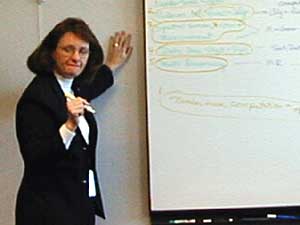Audio
Photos
Your Voice
| ||||||||||||||||||||||||||||||||||||||||||||||||||||||||||
Standards group meets for first time
February 19, 2003
 |
| Education Commissioner Cheri Pierson Yecke leads the task force in a discussion over reforming the state's education standards. (MPR Photo/Tim Pugmire) |
St. Paul, Minn. — State education officials selected 76 people from more than 2,000 applicants to serve on the committee. Their mission is to develop new academic standards in kindergarten through 12th grade for reading and math, to replace the state's current Profile of Learning standards.
Gov. Pawlenty reminded the committee that the show-what-you-know approach of the Profile system was a good idea that got off track. He said he wants its replacement to be among the nation's best standards.
 | |||
"Best sometimes is in the eye of the beholder, so we're going to have to have some consensus emerge about what the criteria is for how we're going to judge these standards," Pawlenty said. "But I hope you'll see the benefit of making sure that the standards are rigorous, that they're focused, that they are user-friendly from a teacher standpoint and an educator standpoint, that we don't celebrate and elevate process over substance."
Pawlenty's education chief has narrowed the committee members' work by providing them model content standards from other states -- California, Ohio, Massachusetts, North Carolina and South Dakota. Commissioner Cheri Pierson Yecke says there's no reason to start from scratch.
"We have got wonderful state standards from a number of other states that committee members have had the opportunity to look at, review and analyze," says Yecke. "They will be taking those and modifying them -- taking the best of the best. And so it's not like they're starting from a blank slate and they have nothing else to work from."
Committee members were divided into eight groups to work on the reading and math standards for specific grade levels. They have sometimes divergent opinions on what's best for students, but they seem generally agreeable to the process.
 | |||
Mike Ricci, a St. Paul charter school founder in the grades 3-5 reading group, says the standards panel is taking a common sense approach.
"We're focusing on what others have done that have been highly rated and ranked, by study groups and organizations that have already looked at them. So, we don't have to go back to square one. We know good work when we see it, and we're going to borrow heavily from that I think," says Ricci.
The goal is to have the new math and reading requirements ready for schools by next fall. William Cooper, a Wayzata businessman and former state Republican Party chairman, is part of the grades 3-5 math group. He says he's confident the groups can reach agreement on new academic standards, despite members' philosophical differences.
"Some of the teachers are a little defensive, and some of the parents are pretty offensive. But in general, everybody's here for one reason. I mean nobody's getting paid for this. So, there's consensus being driven in all cases," says Cooper.
The Minnesota House this week voted to repeal the Profile of Learning standards. The Senate has yet to take up the bill.
Ellen Delaney, a math teacher from North St. Paul and former state teacher of the year, is part of the group charged to develop new high school math standards. She also spent a lot of time on state committees that helped shape the Profile of Learning standards.
Delaney says even though the Profile's days appear numbered, she'll never look at it as a waste of time.
"I will be forever grateful to the Profile, just for creating the conversation around education that it has. We've seen more teachers talking to teachers, talking to parents and community -- just what we're seeing today -- people talking about what's important for kids," says Delaney.
The Minnesota Academic Standards Committee is scheduled to complete the reading and math standards by March 10. A series of public hearings will follow at cities throughout the state. Commissioner Yecke will present the plan to state lawmakers by March 31.
|
News Headlines
|
Related Subjects
|

